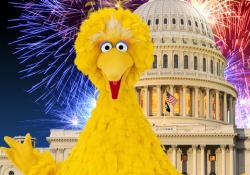Big Bird has emerged as the surprise star of the 2012 campaign. Mitt Romney says he likes Big Bird but wants to cut federal funding to PBS, while the big yellow bird has appeared in an ad made by President Obama’s campaign. Why is Sesame Street on public television, anyway?
Because the networks turned it down. In 1967, a couple of years before the first episode of Sesame Street aired on PBS, one of the co-founders of the Children’s Television Workshop pitched the concept to executives at NBC and CBS. They both passed on the opportunity, as did Time-Life Broadcasting and Westinghouse. The problem wasn’t that the show was for children: Captain Kangaroo had already been a modest success on CBS for 12 years, and the networks had offered periodic programming for preschoolers. But Children’s Television Workshop was a somewhat revolutionary idea in 1967. It had a strongly academic bent, drawing together child psychiatrists and child-development researchers from the ivory tower in a way that suggested profit wasn’t their motivation. Its executives also refused to allow commercials to interrupt the program, although they were open to ads at the beginning and end. The Children’s Television Workshop leadership also insisted that the show focus on disadvantaged urban kids, rejecting calls from television producers that they broaden the target demographic to all preschool children.
PBS desperately needed a winner in the late 1960s and was willing to take a chance. Some PBS programming was so poor that the New York Times television critic noted, “congressmen could scarcely be blamed for wondering if a huge permanent investment in noncommercial video is warranted.” Sesame Street was exactly the kind of innovative show that could change the narrative about public broadcasting.
It’s an odd quirk of history that Bert and Ernie’s first-ever television appearance came not on PBS, but in a preview on NBC. And commercialism was the first thing viewers saw: A Muppet noted that Xerox had sponsored the preview, in a move that infuriated some Sesame Street executives.
Sesame Street has always had an uncomfortable relationship with money. After the show became a smash success, producers worried that the foundations that paid to get the show off the ground would expect it to sustain itself. Some executives adamantly opposed any attempt at merchandising. Even Jim Henson, who was already making money merchandising his comedic Muppets, opposed doing the same with more the educational Sesame Street characters. Eventually, however, the prospect of become a self-financing model convinced most of the creators that Oscar the Grouch dolls wouldn’t tarnish the program.
Got a question about today’s news? Ask the Explainer.
